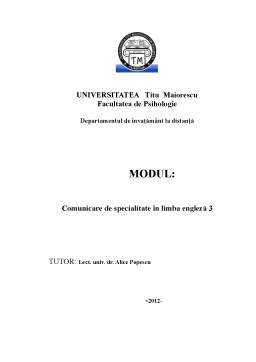Cuprins
- Introducere 3
- Unitatea 1. The future of our world in the next millennium 8
- Unitatea 2. Women – past and future 11
- Unitatea 3. Power and leadership 15
- Unitatea 4. Advertisments 19
- Unitatea 5. Does altruism exist? 22
- Unitatea 6. Does altruism exist? (Part 2) 25
- Bibliografie 31
Extras din curs
INTRODUCERE
1.Scopul si obiectivele cursului:
Cursul de limba engleză pentru învăţământ la distanţă îşi propune să sedimenteze
elemente de limba engleză dobândite în formarea preuniversitară a studentului ID,
elemente lingvistice şi de interpretare necesare unei deschideri a studentului ID către
lumea ştiinţifică internaţională. Pentru o analiză gramaticală şi interpretarea de texte,
sunt folosite tematici cu predilecţie din psihologie (inclusiv psihologie socială,
psihologia comunicării etc.). De asemenea, prin acest curs se urmăreşte formarea
deprinderilor orale şi scrise utile în activitatea socio-profesională, în vederea
căpătării unei autonomii valide de informare şi comunicare în limba engleză.
Obiective generale:
Dezvoltarea de competenţe în utilizarea limbii engleze pentru comunicare şi
informare în general , ca şi în domeniul ştiinţelor sociale şi în special al psihologiei,
astfel încât studenţii să fie capabili :
Ø Să înţeleagă după auz enunţuri în flux verbal;
Ø Să înţeleagă enunţuri, texte citite în limba engleză;
Ø Să comunice verbal un mesaj, enunţ în limba engleză;
Ø Să exprime în cuvinte proprii în limba engleză, în scris, un mesaj/enunţ.
Obiective specifice:
1.pronunţarea de diverse enunţuri cu intonaţia corectă;
2.înţelegerea sensului global al unui mesaj ascultat;
3.raportarea informaţiei ascultate la limbajul şi experienţa culturală proprie;
4.adaptarea formulelor conversaţionale la contextul dat (formal, informal);
5.susţinerea de dialoguri referitoare la sine şi la universul propriu;
6.descrierea de persoane, locuri, activităţi;
7.identificarea unităţilor de conţinut ale unui text;
8.exprimarea înţelesului global al unui text;
9.recunoaşterea şi utilizarea formelor speciale de corespondenţă;
10.valorificarea deprinderilor acumulate pentru perfecţionarea competenţelor de
limbă engleză.
UNITATEA 1:
THE FUTURE OF OURWORLD IN THE NEXT
MILLENIUM
La sfârşitul acestui curs, studentul va putea:
- să îşi însuşească cîteva elemente de vocabular care vizează tipurile
psihologice
- să utilizeze Future Tense Simple
Cunoştinţe privind formarea lui Future Tense Simple
Engleza pentru admitere, Bantaş, Andrei, Ed. Teora, Bucureşti, 1995,
vol. 1;
Practise Your Tenses, Adamson, Donald, Longman, 1996;
Două ore
Pre-reading:
1.Word Web: words related to the key word “FUTURE” (E.g.: anticipate, forecast,
foretell, predict, prognosis,…).
2.Dialogue between an optimist and a pessimist (pages 123-124, Changing Times,
Changing Tenses). Fill in the dialogue (use the right replies).
Reading
Text “The Car of the Future”, (Changing Times, Changing Tenses, pages 120-121).
LANGUAGE FOCUS
New Vocabulary: to be in trouble, ask,/look for trouble, troublesome,
troublemaker/shooter, to get someone into trouble, troublous, disturbed, to fish in
troubled waters; air conditioning; gas (A.E.) vs petrol (B.E.); lights, headlight, light
vs darkness, light/dark colour (blue), light (adj.) vs heavy; foot – feet (goose, tooth);
1 mile = km; to be short of, shortage; supply, to supply.
GRAMMAR FOCUS
1.Expressing comparison with: “as + adj….as + noun”:
(see Penny Ur, op. cit., page 57). E.g.: “as thin as ice”, “as white as snow”.
2.Expressing future time
I. The Simple Future
Use: to express:
ü an action we are not sure about (use of “probably”);
ü hopes, fears, threats, on-the-spot decisions, offers, promises, warnings,
predictions, comments (with expect, hope, believe, I’m afraid, I’m sure, I
know, I think probably);
ü a prediction or a future action or event which may or may not happen.
Time Expressions: tomorrow, tonight, next week/year/.., in two days, the day
after tomorrow, soon, in a week/fortnight, on the 1st of June, in 2003, a.s.o..
Form:
Affirmative: S + shall/will + verb….(short form: ‘ll).
Interrogative: Shall/will + S + verb….?
Negative: S + shall/will + not + verb….(short form: shan’t/won’t).
3. The verb “take” + preposition:
after = to resemble
down = to write/record
for = to mistakenly assume that sb/sth. Is sb./sth. else
For granted = to assume as a fact that does not need any confirmation
In = to receive, admit; to reduce the size of; to include/comprise
off = to remove; to depart (aeroplanes)
over = to take control/possesion of…
to = to adopt as a habit/practice/hobby
Practice
Grammar exercises (G. Gălăţeanu, op. cit., Ed. Albatros, 1980, - v. şi alte ediţii, pag.
216-228) from various grammar books or from the suggested references.
Speaking
Briefly express (in approximately 200 words) how you imagine the future of
psychology in the next millenium. (group or individual work, as best suitable).
Suggestions: machinery development and human brain, coping with physical
impairments: deafness, dumbness, blindness, mental retardness, a.s.o..
Preview document
Conținut arhivă zip
- CUPRINS (1).pdf
- INTRODUCERE.pdf
- UNITATEA_1.pdf
- UNITATEA_2.pdf
- UNITATEA_3.pdf
- UNITATEA_4.pdf
- UNITATEA_5.pdf
- UNITATEA_6.pdf














































